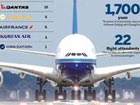| Videos | ? Latest |
|
? Feature | ? Sports | ? Your Videos |
China's first Airbus A380 takes flight

 0 Comment(s)
0 Comment(s) Print
Print E-mail
CNTV, October 18, 2011
E-mail
CNTV, October 18, 2011
China's first Airbus A380, operated by China Southern Airlines Co Ltd, took off at 10 am on Monday at the Beijing Capital International Airport carrying nearly 500 passengers on its maiden domestic flight to Guangzhou, and made a smooth landing at Baiyun International Airport at 1:10 pm as people inside and outside the double-decker cabin cheered.
Among those aboard the world's largest civil aircraft were retired star basketball player Yao Ming and other celebrities.
Zhong Nanshan, a respiratory doctor and academician of the Chinese Academy of Engineering, said the Superjumbo provides an ideal space in the cabin to handle affairs that are usually done in the office.
"Except for the lack of Internet access, I can do business affairs on the computer because of the facilities and lower noise in the Superjumbo cabin," Zhong was quoted as saying by CAAC Journal.
"The Superjumbo is an ideal choice for a long flight," he said.
It will be flying daily on the Beijing-Guangzhou-Beijing route from Oct 17 to 26, departing at 10 am from Beijing as flight number CZ3000 and returning from Guangzhou at 6 pm as flight CZ3999.
From Oct 27 to 29, it will fly the Beijing-Shanghai Pudong-Beijing route as flight numbers CZ6000 and CZ6999.
"I've never thought such a four-engine Superjumbo could fly with so little noise and make such a soft landing," said Wang Yu, a Guangzhou-based media representative who was a passenger.
The ticket price is the same as that of other aircraft flying those routes, and passengers can get a 10 percent discount buying tickets through China Southern's website. The price of an economy class seat between Beijing and Guangzhou is 1,700 yuan ($266). The seat price in luxury first class is 4,760 yuan and 3,910 yuan for first class.
According to China Southern, tickets in the top two classes are already soldout and 80 percent of economy class seats have been sold, 30 percentage points more than average.
On Tuesday, occupancy for the Beijing-Guangzhou flight exceeded 90 percent, and that for the return flight was 100 percent. Tickets for the eight luxury seats and 70 first-class seats on the round-trip flights were sold out days before.
After October, the aircraft will still operate on the two domestic routes until the airline's second A380 is delivered, which is expected to be in December. Then it will begin flying international routes. China Southern ordered five A380s, which will all be delivered by 2013.
Liu Qian, chief pilot of the A380 and China's leading pilot with 16,000 flying hours, said he finds the operational system very smart and stable. "The larger the aircraft, the easier to keep it stable and under control," he told China Daily.
He led a team of 10 pilots and 10 co-pilots in a more than one-month study in Toulouse of the A380 model.
Liu said another 20 pilots and co-pilots will soon be sent for the intensive theoretical and operational training in France in preparation for the delivery of the second A380 by the year's end.
Zhang Yangyang, an eight-year veteran flight attendant on domestic and international flights, said the bigger the plane, the more difficult for the flight attendants to do the cabin work.
"It takes a much longer time to clean and is more work ... but the good thing is, few passengers will complain about not having room for mid-sized luggage."
The new aircraft requires 22 flight attendants, almost double the number on the A330.
China Southern is the first Chinese carrier to operate the A380 and the seventh globally.
China is the world's second-largest domestic civil aviation market and will account for 9.8 percent of the world's total passenger traffic by 2030, according to a forecast Airbus released in September.
The country will also have the second-fastest growth rate, after India, of 7.2 percent annually in domestic civil aviation passenger traffic over the next 20 years, the European plane maker said.
Statistics from Airbus indicate that the global market will need 1,781 large aircraft with more than 400 seats, such as the A380, in the next 20 years and 45 percent of these will be delivered to Asia.





